
Like most baby boomer kids, my father was a veteran. So was Sally’s. They were both buried in military cemeteries, accompanied by salutes, a variety of uniformed service members, even a caisson. The service members were precise and incredibly respectful, reminding me that being in the military almost by definition means you put your life at risk.
Veterans were synonymous with WWII when I was a child, the good war against the unimaginably evil Hitler but also the horror of the atom bomb. I don’t think I was the only one who wished for “world peace” when I blew out birthday candles or participated in student United Nations.
Veterans were synonymous with WWII when I was a child, the good war against the unimaginably evil Hitler but also the horror of the atom bomb. I don’t think I was the only one who wished for “world peace” when I blew out birthday candles or participated in student United Nations.
The Vietnam war destroyed illusions of righteousness. The rationale for the undeclared war was thin, the draft sent young men to fight and die, and the military industrial complex that Eisenhower had warned against seemed unchecked. I joined in antiwar protests against the government and the university, which sponsored ROTC and supplied policy experts. Those who served, voluntarily or otherwise, were not considered heroes on return. It became hard to parse respecting and honoring those who served while vehemently opposing those who gave them the orders.
I have to admit that when the National Health Service Corps funded my community health center position, I chose to be a civil servant and not a commissioned officer. Although the Vietnam war was over, I didn’t want to take the chance that I could be redeployed to a war I couldn’t support.
Every corner of the world has its history of war, and its remembrances. Town squares throughout Europe and North America have statues and cenotaphs and memorials to war dead—I have seen them going back to the crusades. Conquests are celebrated in pre-Columbian stones and Egyptian monuments, ruins of Angkor Wat and Chinese tombs. In the US we also have Memorial Day and Veterans Day.
Since moving to Canada, I have seen poppies blossom on coats and jackets in the weeks leading to the November 11 Remembrance Day to honor fallen service members—the same date as Veterans Day in the US. After all, John McCrae, the author of “In Flanders Fields (the poppies grow)”, was Canadian. Cenotaphs here mention places like Vimy Ridge and Passchendaele, maybe the liberation of the Netherlands—I hadn’t been familiar with them. Out of curiosity, one December 7th I asked people in Canada if they knew why that was a special day and no one did—Pearl Harbor wasn’t so high on their list of memorable battles. I happened to be in Adelaide one ANZAC day, and was astonished not only at the extensive parade of different units, but the locations they fought: one banner boasted, ”Atlantic, Mediterranean, Crete, Syria, Tobruk, Burma, Pacific, Tokio Bay, Napier, Nizam, Nestor, Norman and Nepal” and there were more banners, a lot more. Even a list of UN peacekeeper missions. Who knew?
Sometimes the history of the world seems to be nothing but a litany of wars and power struggles. It may be possible to explain it as an evolutionary adaptation of competition, but if it is not counterbalanced by cooperation, we will surely self-extinguish; nuclear weapons and the Anthropocene both demand cooperation for survival. Although Thomas Piketty suggests our world is overall becoming less violent, dismal examples such as Ukraine, Israel, Palestine, Afghanistan and Sudan remind us we are far from peace. Also, ruthless authoritarians have not become extinct.
What do the veterans of these conflicts think? Are they, the “universal soldiers”, really to blame? And what about the civilians who suffer and die in wars—are they not also veterans of the conflicts? Most people don’t want to revisit that trauma and don’t talk about it. Fairly recently, there has been more recognition of how widespread PTSD is, but surely people have suffered this for millennia. I have heard that experienced military people who have experienced the devastation, hate war. They see their job as preventing it and protecting their troops. And those who fight are mostly fighting for their buddies rather than some justification for war. As Phil Ochs sang, “It’s always the old who lead us to the war, and always the young who must die.”
Sally’s dad didn’t talk about what it was like to be the bombardier for planes flying more than 30 missions out of East Anglia to attack German targets, although the air crews had a staggering mortality and each time he flew there was a good chance he would not return. It wasn’t until many years later, when some reunions were organized, that he learned what happened to people from his unit—and even met a few again–and Sally learned of his list of targets.
Just this past year, she was talking to someone from her aquatics class about Ukraine and discovered her parents had been sent from Ukraine to work in a tank factory in Germany as slave labor. Sure enough, that had been one of Sally’s dad’s targets. What were the chances? As it happened, those working in the factory were happy to see the German war machine damaged, and now the children of bomber father and target parents could be friends.
My father was drafted late, being 4F due an eye injury, and spent most of the time in the Army learning Japanese. After being stationed briefly in post-war Japan, he developed a love of the area and people and had a career in agricultural economics in developing countries. His participation in the military built bridges to the other side of the world.
And so, although it may be unrealistic to eliminate deadly conflict and use of force for defense, I try to find hope that sometimes the worst can be avoided–and that indeed swords can be beaten into plowshares. For me, Veterans Day is a time to honor the humanity of veterans, and not glorify war.


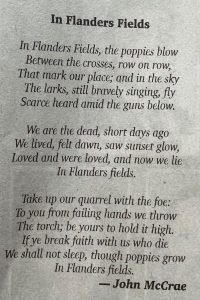
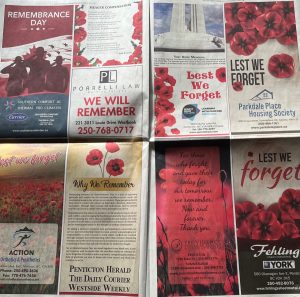
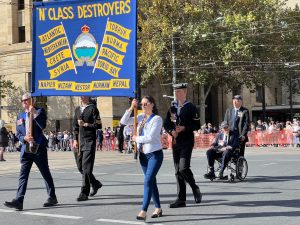
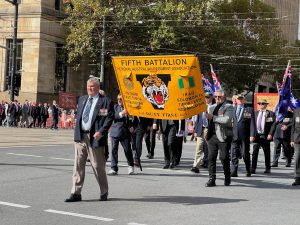
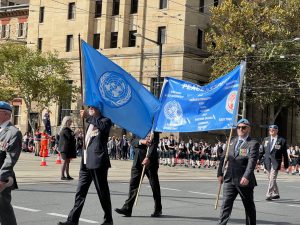
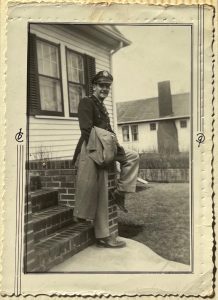
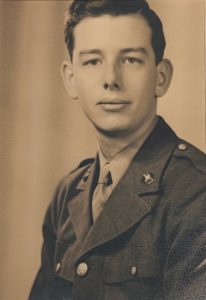

Khati, your remarks are thoughtful and make me mindful of all that the so-called civilized world has gone through over the years in the name of religion, land-grabs and so on. We’ve just returned from a two-cruise around parts of Italy and Croatia, with a wonderful historian on-board who gave four lectures and it seems that (as we know), history was written by the victor, wars were fought all the time (frequently Christians against Muslims during the era we looked at). The Crusades were a sham, much were just about opening trading routes and capturing treasure or establishing religion. We saw ornate churches, filled with gold and jewels (one in Malta comes to mind) and, much as I was impressed by the splendor, I was also horrified by the tremendous expense and upkeep that is squandered with such glorification, while the masses are kept ignorant. The cycle repeats and repeats.
Your words are poignant, smart and heartfelt. Thank you for sharing them today.
Thanks for your comments and your observations Betsy. Your trip sounds wonderful, and your guide brought some insight into the history that produced all the splendour and the devastation. It can be painful to have our eyes wide open, but otherwise we are doomed to repeat the worst parts of history. May the light shine.
Thanx for your story Khati.
Veterans Day as a time to honor the humanity of veterans and not glorify war – imagine.
You and me and John Lennon. Peace.
This is almost poetic in its longing for peace in a world that has seemingly known very little of it. The combat vets I have known all did not like to talk about it. Some memories are best left unexamined, I am sure.
I had almost forgotten those memories of birthday wishes but they haven’t exactly been granted either. I do believe that peace is what most people in the world want and it is horrifying how they become the victims, whether civilians or military. Maybe we cope by telling ourselves better stories and trying to forget.
Beautiful, deeply thought-out and written overview with some pretty profound observations and reflections. I do recall how shocked I was to discover that so many people who saw action were motivated strictly to protect their buddies, although, one I discovered that reality it made perfect sense.
Re: Sally’s father’s experience. Those B-17s that made up the vulnerable squadrons flying over Europe were a nightmare for both sides. They were, however, a miracle of industrial ingenuity in their design and manufacture. They cranked out several of these machines daily during wartime.
Thanks. They have restored a number of those old planes and you can get a ride on them—Sally did that once. But when they were used in the war, the chance of returning was a lot worse.
Khati: As a CO I was moved by your compassionate essay.
For me, the memorials are an insufficient recognition of the sacrifices of soldiers, civilians, and all those who suffered from wars–both allies and foes.
Due to computer problems, and an extended trip to St. Paul, I was not able to write on this topic.
If I had the time I would have written about the visible and invisible memorials including the DC WW2 memorial, the Vietnam memorial, and the Okinawa memorial.
The DC is a classic Roman/German memorial by a German American that focuses on the sacrifices of the dead through its stele representation of spears to heaven. I envisioned the center of the circular space. I take a more general view of the term “veteran.” Such as local farmers in patriot gardens, women in sweatshops preparing clothing for the troops, coal miners with picks, scientists in Illinois and New Mexico experimenting with nuclear weapons (and Oppenheimer who served and then was pushed out of office), and a wall where visitors could leave notes or memories about the war.
The Vietnam War memorial exhibits the fractures in our society as well as the world. Maya Lin’s creation of a wall next to a descending path which gave the feeling of walking into a grave, provided an emotional sense of the terrors of war, rather than a classical sense of awe for the hero.
The Secretary of the Interior wanted heroism. He commissioned a competing set of memorials: 1) three heroic soldiers fully armed who had just been engaged in a battle standing shoulder to shoulder with exhaustion. They were a representation of the Band of Brothers. 2) To respond to the political trends, he commissioned a sculpture of three women caring for a wounded soldier. Two of them held the prone warrior and one signaled to a helicopter to pick him up. Very heroic. But a false image: women were not allowed in the front lines. There was rarely room for three to take care of one. Female nurses were often treated abusively. Hospital conditions were terrible. Some with a sense of their trade sought out nightly or off-hour shifts in the Vietnamese hospitals.
Finally, these memorials favored patriotism rather than compassion for the ones who served and died. In Japan, there is a memorial for the bloody battle of Okinawa which killed and maimed thousands of Okinawans, Japanese, and Americans. The memorial pays tribute and sorrow to all three groups: allies, enemies, and the many Okinawan civilians whose lives were destroyed,
—
Thanks for you thoughtful comments. It is not too late to submit your own story, much of which you may already have written here (and you can always submit on old prompts too, though a heads up from the administrators can help people find a new submission). I also struggle with some of the memorials, but the Maya Lin one is very moving and personalizes the consequences of war. And those effects are not limited to enlisted military as you well know. We do need to remember it all. Peaceful conflict resolution has a long way to go.
Excellent essay! You raise so many interesting points about the veterans who fought (and continue to fight) in our wars. Even the “just” ones hurt so many innocents.
It is hard to think about this topic especially today with the ongoing carnage in the world. So much anguish for so many. Making peace is sometimes harder than making war, but in the end, and especially after the bloodshed, it’s what all need.
Khati,
Well-told, and extremely moving. Thank you for sharing. I knew several guys in my senior year of college in ’68 who were frantically searching for alternative service such as the one you found in health service. Alas, it didn’t work for most of them who wound up having to fly medivac helicopters into and out of active firefights. I had friends who wanted to enter the ministry and instead had to be trained to use the weapons of war while risking their own lives doing it. It all was a contemporary tragedy for those of us who lived through it.
I’m sorry to hear the stories about your friends, which were unfortunately not unique. Those tragedies certainly fueled the antiwar movement and influenced the lives of a generation. It’s hard to explain now.